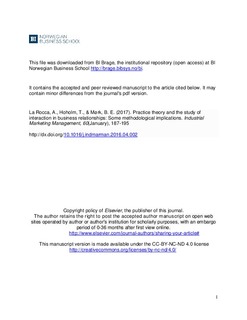Practice theory and the study of interaction in business relationships: Some methodological implications
Journal article
Permanent lenke
http://hdl.handle.net/11250/2432685Utgivelsesdato
2017Metadata
Vis full innførselSamlinger
- Scientific articles [2181]
Originalversjon
Industrial Marketing Management, 60(2017)January, 187-195 http://dx.doi.org/10.1016/j.indmarman.2016.04.002Sammendrag
Research on customer–supplier relationships in business markets has evidenced the centrality of interaction processes. However, while several studies examine interaction processes and their consequences in relation to the resource and activity layers of business relationships, the actor layer has not attracted the same attention. This raises the question: how adequate are our methodological approaches for investigating interaction processes in business networks? In this paper, we examine how practice-based approaches, with their preference for ethnography and techniques such as multi-site observations and analytical interviewing and treating actors as emergent entities, can help orient the research on business interaction. We argue that some of the themes emerging in practice-based approaches, applied to studies of interaction in business networks, could yield a better understanding of the dynamics of organizing across organizational boundaries. We conclude that research on interaction in business relationships would benefit from (1) zooming in and zooming out of multiple sites of interaction to better understand interaction processes and the role of controversies and interdependences among the different interacting roles; (2) including fluid multiple roles in business relationships that treat actors as emergent entities and transcend the ‘fixed’ conceptualization of two actor levels – individual and organizational; and (3) paying major attention to the reproduction of interaction practices and the role of materiality that permit relationships to be temporarily stabilized.
Beskrivelse
This is the accepted and peer reviewed manuscript to the article
